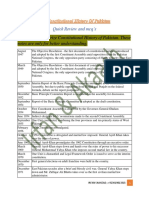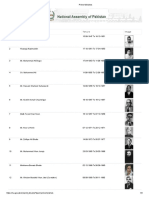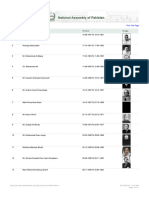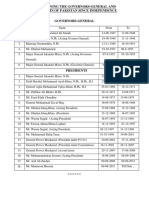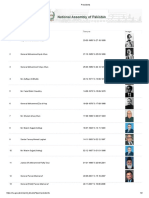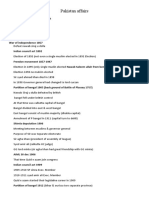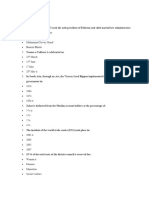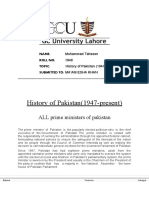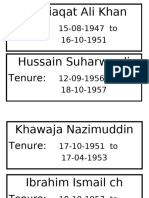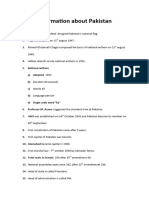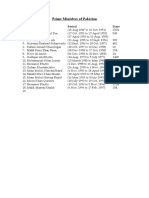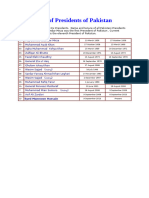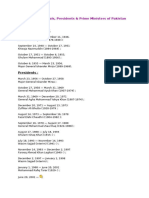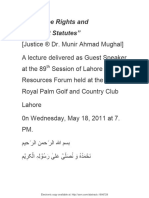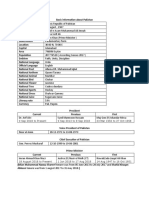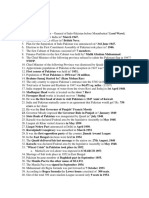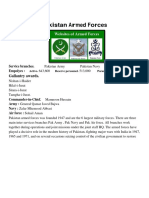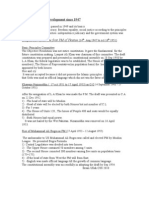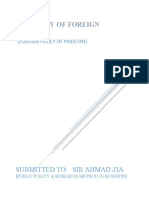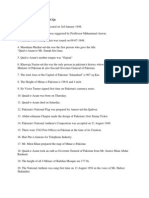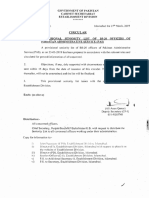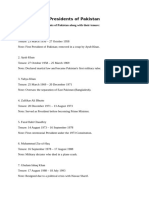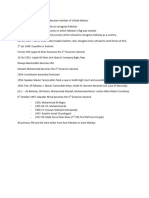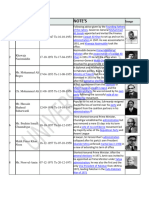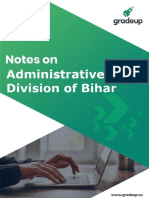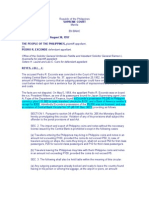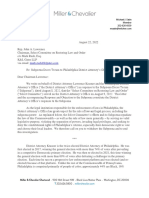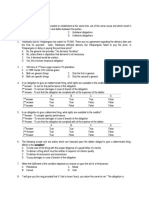M.Hazim Bhatti
M.Hazim Bhatti
Uploaded by
rh7615599Copyright:
Available Formats
M.Hazim Bhatti
M.Hazim Bhatti
Uploaded by
rh7615599Original Title
Copyright
Available Formats
Share this document
Did you find this document useful?
Is this content inappropriate?
Copyright:
Available Formats
M.Hazim Bhatti
M.Hazim Bhatti
Uploaded by
rh7615599Copyright:
Available Formats
Pakistan Studies
Qus:1 Why is it that any prime minister of Pakistan didn't complete their 5-year term?
Ans : No Pakistani Prime Minister has completed a full 5-year term due to the dominant
role of the military in the country's governance.
All Prime Ministers Of Pakistan(1947 to Onwards)
Sr.No Names From To
1 Mr. Liaquat Ali Khan 15-08-1947 16-10-1951
2 Al-Haj Khuwaja Nizamuddinn 19-10-1951
3 Mr. Mohammad Ali (Bogra) 17-04-1953 23-10-1954
24-10-1954 10-08-1955
4 Mr. Mohammad Ali (Ch.) 11-08-1955 11-09-1956
5 Mr. Huseyn Shaheed Suhrawardy 12-09-1956 17-10-1957
6 Mr. Ismail I. Chundrigar 18-10-1957 15-12-1957
7 Malik Firoz Khan Noon 16-12-1957 27-10-1957
8 Mr. Zulfiqar Ali Bhutto 14-08-1973 27-03-1977
28-03-1977 05-07-1977
9 Mr. Mohammad Khan Junejo 23-03-1985 29-05-1988
10 Mohtarma Benazir Bhutto 02-12-1988 05-08-1990
11 Mr. Ghulam Mustafa Jatoi(CareTaker) 06-08-1990 05-11-1990
12 Mr. Mohammad Nawaz Sharif 06-11-1990 17-07-1993
13 Mir. Balakh Sher Mazari 18-04-1993 26-05-1993
(Decleared Supreme Court As Illeagel)
14 Mr. Moeen Qureshi (CareTaker) 18-07-1993 18-10-1993
15 Mohtarma Benazir Bhutto 19-10-1993 04-11-1996
16 Malik Meraj Khalid (Care Taker) 05-11-1996 16-02-1997
17 Mr. Mohammad Nawaz Sharif 17-02-1997 11-10-1999
18 Gr. Parvez Musharraf (Chief Executive) 12-10-1999 22-11-2002
19 Mir. Zafarullah Khan Jamali 23-11-2002 26-06-2004
20 Ch. Shujat Hussain 30-06-2004 25-08-2004 (Resigned)
21 Mr. Shaukat Aziz 28-08-2004 15-11-2007
22 Mr. MohammedMian Soomro (CareTaker) 16-11-2007 24-03-2008
23 Syed Yousaf Raza Gillani 25-03-2008 19-06-2012
24 Raja Parvez Ashraf 22-06-2012 24-03-2013
25 Justice(Retd) Mir Hazar Khan Khoso 25-03-2013 04-06-2013
(CareTaker)
26 Mr. Mohammad Nawaz Sharif 05-06-2013 28-07-2017
27 Mr. Shahid Khaqan Abbasi 01-08-2017 31-05-2018
28 Mr. Justice (Retd) Nasir-ul-Mulk 01-06-2018 18-08-2018
29 Mr.Imran Khan 18-08-2018 10-04-2022
30 Mian Mohammad Shehbaz Sharif 11-04-2022 To Date
Prepare By M. Hazim Bhatti
Pakistan Studies
All Governor Generals Of Pakistan(1947 to Onwards)
Sr.No Name Period
1 Quaid-i-Azam Mohammed Ali Jinnah. 14-8-1947 to 11-9-1948
Khawaja Nazimuddin 14-9-1948 to 11-11-1948
2 (Acting Governor-General)
(Governor-General) 12-11-1948 to 18-10-1951
3 Mr. Ghulam Mohammed. 19-10-1951 to 6-8-1955
4 Major General Iskandar Mirza 7-8-1955 to 5.10-1955
(Acting Governor-General)
(Governor-General) 6-10-1955 to 22-3-1956
All Presidents Of Pakistan(1947 to Onwards)
Sr.No Name Period
1 Major General Iskander Mirza 23-3-1956 to 26-10-1958
2 Field Marshal Mohammad Ayub Khan 27-10-1958 to 24-3-1969
3 General Agha Mohammad Yahya Khan 2-3-1969 to 19-12-1971
4 Mr. Zulfikar Ali Bhutto 20-12-1971 to 14-8-1973
5 Mr. Fazal Elahi Chaudhry 14-8-1973 to 15-9-1978
6 General Mohammad Zia-ul-Haq 16-9-1978 to 16-8-1988
Mr. Ghulam Ishaq Khan
7 (Acting President) 17-8-1988 to 12-12-1988
(President) 13-12-1988 to 18-7-1993
8 Mr. Farooq Ahmad Khan Leghari 14-11-1993 to 1-12-1997
9 Mr. Muhammad Rafiq Tarar 1-1-1998 to 19-6-2001
10 General Pervez Musharraf.
i. President under P.C.O 20-6-2001 to 15-11-2002
ii. President under Constitution 16-11-2002 to 28-11-2007
iii. President Pervez Musharraf (second term) 29-11-2007 to 17-08-2008
11 Mr. Asif Ali Zardari 09-09-2008 to 08-09-2013
12 Mr. Mamnoon Hussain 09-09-2013 to 08-09-2018
13 Dr. Arif Alvi 09-09-2018 to 10-03-2024
14 Asif Ali Zardari 10-03-2024 to Date
Prepare By M. Hazim Bhatti
Pakistan Studies
The 1973 Constitution of Pakistan
The 1973 Constitution of Pakistan is the country’s third constitution, following those of 1956 and 1962.
It was drafted under the leadership of Prime Minister Zulfikar Ali Bhutto and was unanimously approved
by the National Assembly on April 10, 1973. The Constitution came into effect on August 14, 1973
Amendments In 1973 Constitution
An amendment to the 1973 Constitution of Pakistan refers to a formal change or addition proposed and
ratified to modify the Constitution’s text. These amendments can address various aspects, such as
political structure, governance, judicial reforms, and social issues. To be enacted, an amendment must
be approved by a two-thirds majority in both houses of the Parliament (the National Assembly and the
Senate) of Pakistan
The Constitution of Islamic Republic of Pakistan 1973 was unanimously adopted by the then National
Assembly of Pakistan on April 12, 1973 when it was signed by the President of the Assembly. But soon
after the enactment of the Constitution, it had to undergo a series of amendments which included
minor and major amendments. Seven such amendments were made from May 8, 1974 to May 16, 1977
by the National Assembly that passed the Constitution.
Martial Law was proclaimed by the then Chief of Army Staff, General Muhammad Zia-ul-Haq on 5th July,
1977. The 1973 Constitution remained the supreme law of the land, subject to the condition that certain
parts thereof had been held in abeyance on account of State necessity. The Supreme Court of Pakistan
recognized the right of the Chief Martial Law Administrator to perform all such acts or legislative
measures which were in including the power to amend it, in Begum Nusrat Bhutto Vs. Chief of Army
Staff and Federation of Pakistan. This enabled the then Chief Martial Law Administrator/President to
make series of amendments by issuing amendment Orders during the period from February, 1979 to
January, 1985. Finally major amendments were made through the Revival of Constitution Order on 17th
March 1985. These amendments changed the whole complexion of the 1973 Constitution.
1st Amendment (1974)
Removed references to East Pakistan.
2nd Amendment (1974)
Declared Ahmadis as non-Muslims.
3rd Amendment (1975)
Increased the maximum period from one month to three months.
4th Amendment (1975)
Prepare By M. Hazim Bhatti
Pakistan Studies
Increased the number of seats in the National Assembly and restricted the jurisdiction of the High
Courts.
5th Amendment (1976)
Altered the tenure and retirement age of judges.
6th Amendment (1976)
Extended the retirement age of judges.
7th Amendment (1977)
Allowed the Prime Minister to obtain a vote of confidence from the people.
8th Amendment (1985)
Allowed the President to dissolve the National Assembly.
9th Amendment (1985)
Proposed the enforcement of Sharia law (not fully enacted).
10th Amendment (1987)
Changed the duration of parliamentary sessions.
11th Amendment (1989)
Increased the number of seats for women in the National Assembly (not enacted).
12th Amendment (1991)
Created special courts for heinous crimes.
13th Amendment (1997)
Removed the President’s power to dissolve the National Assembly.
14th Amendment (1997)
Introduced anti-defection laws.
15th Amendment (1998)
Sought to enforce Sharia law (not enacted).
16th Amendment (1999)
Increased the retirement age of laborers.
Prepare By M. Hazim Bhatti
Pakistan Studies
17th Amendment (2003)
Reinstated the President’s power to dissolve the National Assembly.
18th Amendment (2010)
Enhanced provincial autonomy and removed the President’s power to dissolve the Parliament.
19th Amendment (2010)
Adjusted the process for appointing judges.
20th Amendment (2012)
Established a neutral caretaker government for elections.
21st Amendment (2015)
Established military courts for terrorism-related cases.
22nd Amendment (2016)
Changed the qualifications for the Chief Election Commissioner.
23rd Amendment (2017)
Extended the tenure of military courts for two more years.
24th Amendment (2017)
Adjusted the allocation of seats in the National Assembly based on the latest census.
25th Amendment (2018)
Merged the Federally Administered Tribal Areas (FATA) with Khyber Pakhtunkhwa province.
Prepare By M. Hazim Bhatti
You might also like
- Call of Duty 4 - Modern Warfare Multiplayer Keys (For CoD4X)Document1 pageCall of Duty 4 - Modern Warfare Multiplayer Keys (For CoD4X)heregoesnothing57100% (3)
- Family Prayer For The Faithful Departed - Cubao DmlaDocument1 pageFamily Prayer For The Faithful Departed - Cubao DmladiksajonaNo ratings yet
- Constitutional History of Pakistan MCQs For LGAT-1-2Document21 pagesConstitutional History of Pakistan MCQs For LGAT-1-2Maria Qadir100% (2)
- Lich v. US Rubber (1941)Document3 pagesLich v. US Rubber (1941)Amber AncaNo ratings yet
- Deny Yourself and Take Up Your Cross (Sermon)Document3 pagesDeny Yourself and Take Up Your Cross (Sermon)tsupasat100% (8)
- PM ListDocument1 pagePM Listhellohi123110No ratings yet
- Faraz Ali Kalhoro - 03043469122 President of PakistanDocument2 pagesFaraz Ali Kalhoro - 03043469122 President of Pakistanadeelsoomro012345No ratings yet
- List Showing The Prime Ministers of Pakistan Since IndependenceDocument2 pagesList Showing The Prime Ministers of Pakistan Since IndependenceMuhammad ShafiqNo ratings yet
- Prime Ministers of PakistanDocument3 pagesPrime Ministers of Pakistanmunrehman44No ratings yet
- Prime Ministers of PakistanDocument3 pagesPrime Ministers of Pakistanjevowe7044No ratings yet
- Prime MinistersDocument3 pagesPrime MinistersNisar GujjarNo ratings yet
- Prime MinistersDocument3 pagesPrime Ministersmrashraf947No ratings yet
- Prime MinistersDocument3 pagesPrime MinistersfaisalNo ratings yet
- Constitution - Legal SystemDocument51 pagesConstitution - Legal SystemArif JamaliNo ratings yet
- Prime MinistersDocument3 pagesPrime Ministers98ayeshakhnNo ratings yet
- National Assembly of PakistanDocument3 pagesNational Assembly of Pakistanaroojmunawar669No ratings yet
- Governors Generals Presidents 1947Document1 pageGovernors Generals Presidents 1947Muhammad ShafiqNo ratings yet
- PresidentsDocument2 pagesPresidentsfaisalNo ratings yet
- All Prime Minister's of PakistanDocument1 pageAll Prime Minister's of PakistanSyedlakhtehassanNo ratings yet
- 1) General ElecDocument4 pages1) General Elecwasiadnan708No ratings yet
- List Showing The Governors-General and Presidents of Pakistan Since IndependenceDocument1 pageList Showing The Governors-General and Presidents of Pakistan Since IndependenceToqeer RazaNo ratings yet
- Pakistan AffairsDocument8 pagesPakistan AffairsDanish NazeerNo ratings yet
- Sindh Police GK Part 8 - 1Document29 pagesSindh Police GK Part 8 - 1pathanwaqas255No ratings yet
- Governors-General of Pakistan, 1947-1956: List of Primeministers of Pakistan 1-Liaquat Ali KhanDocument4 pagesGovernors-General of Pakistan, 1947-1956: List of Primeministers of Pakistan 1-Liaquat Ali KhanEngr Ghulam MustafaNo ratings yet
- 10 Class Pak Studies Notes Chapter 2Document37 pages10 Class Pak Studies Notes Chapter 2Mariam hannahNo ratings yet
- Tahseen's Assighnment 5Document15 pagesTahseen's Assighnment 5Tahseen TahseenNo ratings yet
- Tahseen's Assighnment 2Document17 pagesTahseen's Assighnment 2Tahseen TahseenNo ratings yet
- Power Nexus of PakistanDocument3 pagesPower Nexus of PakistanafatqiamatNo ratings yet
- PresidentsDocument2 pagesPresidents98ayeshakhnNo ratings yet
- prime ministerDocument16 pagesprime ministerNabila.ashrafNo ratings yet
- Ex Prime Ministers of PakistanDocument1 pageEx Prime Ministers of PakistanAtif MehmoodNo ratings yet
- 1973 Constituional AmendementDocument5 pages1973 Constituional AmendementZainab TahirNo ratings yet
- Lecture 5 Political History of PakistanDocument33 pagesLecture 5 Political History of PakistanAFZAL MUGHALNo ratings yet
- Post Partition PakDocument12 pagesPost Partition Pakimarnullah jatoiNo ratings yet
- Prime Ministers of PakistanDocument1 pagePrime Ministers of Pakistanmahesani_128_suhaiNo ratings yet
- List of Presidents of PakistanDocument1 pageList of Presidents of PakistanAtif MehmoodNo ratings yet
- Governer Generals, Presidants and PMs of PakistanDocument3 pagesGoverner Generals, Presidants and PMs of PakistanAtif MehmoodNo ratings yet
- General Aur Sayasatdan Tareekh Ki Adalat Mein by Qayyum NizamiDocument300 pagesGeneral Aur Sayasatdan Tareekh Ki Adalat Mein by Qayyum NizamiMuhammad ShoaibNo ratings yet
- SSRN Id1906729Document89 pagesSSRN Id1906729Demo TestNo ratings yet
- Latest Affairs of PakistanDocument7 pagesLatest Affairs of Pakistanبابو جانNo ratings yet
- Business and GovernmentDocument9 pagesBusiness and GovernmentEssam F. ShoushaNo ratings yet
- CmarchiveDocument4 pagesCmarchivebillNo ratings yet
- Pakistan Affairs 2. He Was The Governor - General of Indo-Pakistan Before Mountbatten? Lord WavelDocument23 pagesPakistan Affairs 2. He Was The Governor - General of Indo-Pakistan Before Mountbatten? Lord WavelXhéhzÂda saleem zehriNo ratings yet
- List Foreign Ministers of PakistanDocument2 pagesList Foreign Ministers of PakistanHB ChandioNo ratings yet
- Pakistan Armed Forces: Gallantry AwardsDocument9 pagesPakistan Armed Forces: Gallantry AwardsmamoonNo ratings yet
- Birth of PakistanDocument11 pagesBirth of Pakistanmohsinsial1No ratings yet
- The Constitutional Development Since 1947Document2 pagesThe Constitutional Development Since 1947noman iqbal0% (1)
- Ministry of Foreign Affairs FinalDocument21 pagesMinistry of Foreign Affairs Finalsamia arifNo ratings yet
- # Name Took Office Left Office Party: Syed Ali Ahmed ShahDocument2 pages# Name Took Office Left Office Party: Syed Ali Ahmed ShahklatifdgNo ratings yet
- MCQ Events of Pakistan Movement, Important For Mcqs Test Preparation and Ce-Pakistan Affairsas Well.Document5 pagesMCQ Events of Pakistan Movement, Important For Mcqs Test Preparation and Ce-Pakistan Affairsas Well.Shahzaib KhanNo ratings yet
- Complete Political Current NotesDocument34 pagesComplete Political Current Notescs2015ok77No ratings yet
- General Knowledge For MCQsDocument29 pagesGeneral Knowledge For MCQsMalik Mughera Awan33% (3)
- Political and Constitutional Development of Pakistan 1959-2020Document12 pagesPolitical and Constitutional Development of Pakistan 1959-2020Owais AliNo ratings yet
- Provisionaly Seniority List 29-03-2019Document6 pagesProvisionaly Seniority List 29-03-2019Faizan RasoolNo ratings yet
- Presidents of PakistanDocument3 pagesPresidents of Pakistanzahidnadeem00000No ratings yet
- Nawaz Sharif's WikipediaDocument19 pagesNawaz Sharif's WikipediaAamir Hussain100% (1)
- History of Pakistan DSJDocument1 pageHistory of Pakistan DSJarslanNo ratings yet
- Ayyub Khan EraDocument5 pagesAyyub Khan EraJazib WaheedNo ratings yet
- Martial Laws in Pakistan With Dates and NamesDocument7 pagesMartial Laws in Pakistan With Dates and Nameszulqurnain gujjarNo ratings yet
- Martial Laws in PakistanDocument3 pagesMartial Laws in PakistanTalha Sohail80% (5)
- PDF Expected Seniority List of Principal Associate Prof.Document11 pagesPDF Expected Seniority List of Principal Associate Prof.Sana AsadNo ratings yet
- List of Prime Minister of Pakistan From 1947 To 2024Document6 pagesList of Prime Minister of Pakistan From 1947 To 2024Universal PCONo ratings yet
- Administrative Division of Bihar 93Document21 pagesAdministrative Division of Bihar 93Upsc GuideNo ratings yet
- Kenny InvestDocument2 pagesKenny InvestJasper Pineda GermediaNo ratings yet
- JLG Loan AgreementDocument16 pagesJLG Loan Agreement01balajiemitraNo ratings yet
- Consti 1Document223 pagesConsti 1Tj CabacunganNo ratings yet
- Bomb DetectionDocument3 pagesBomb DetectionOarms AdvanceNo ratings yet
- Senate v. ErmitaDocument1 pageSenate v. ErmitaKarisse Viaje100% (2)
- People Vs ExcondeDocument6 pagesPeople Vs Excondemfdm386No ratings yet
- NFL24 CS DynDocument1 pageNFL24 CS DynAndré GiraudNo ratings yet
- Joey GabrielDocument5 pagesJoey GabrielAndré PitolNo ratings yet
- Harga 1 01102022Document9 pagesHarga 1 01102022Berkah ShopNo ratings yet
- 2022.08.22 Letter Re SubpoenaDocument6 pages2022.08.22 Letter Re SubpoenaChris GeidnerNo ratings yet
- Wedding Script Roleplay 9Document3 pagesWedding Script Roleplay 9Jaiza Kathrina BaylosisNo ratings yet
- Keeping Children Safe in Education Sep 2020 PDFDocument119 pagesKeeping Children Safe in Education Sep 2020 PDFhumejraNo ratings yet
- AffidavitsDocument2 pagesAffidavitsBillie Balbastre-RoxasNo ratings yet
- Ambedkar's Political NationalismDocument15 pagesAmbedkar's Political NationalismgnanaaloysiusNo ratings yet
- Lawyer Defense Criminal Activity Indigent Public Defenders Consent DecreesDocument2 pagesLawyer Defense Criminal Activity Indigent Public Defenders Consent DecreesColeenNo ratings yet
- Keys To Practice of Relative ClausesDocument9 pagesKeys To Practice of Relative ClausesPhuc TranNo ratings yet
- Apprac CaseDocument7 pagesApprac CaseJm CruzNo ratings yet
- People v. DobleDocument3 pagesPeople v. DobleGia DimayugaNo ratings yet
- World Soccer October 2020Document100 pagesWorld Soccer October 2020Nagy Magdy100% (1)
- Teacher Class Program S.Y. 2021-2022: Jose Sanvictores Sr. National SchoolDocument2 pagesTeacher Class Program S.Y. 2021-2022: Jose Sanvictores Sr. National SchoollinelljoieNo ratings yet
- Obligations Part 1Document2 pagesObligations Part 1Wawex DavisNo ratings yet
- Introduction To The PlayDocument5 pagesIntroduction To The Playmithunraj7437No ratings yet
- Case AnalysisDocument5 pagesCase AnalysisNiharika SalarNo ratings yet
- Mythology: Faerie SexDocument6 pagesMythology: Faerie SexGnomeMadeIonNo ratings yet
- Freemasonrymitchell PDFDocument728 pagesFreemasonrymitchell PDFMarcoAntonioSouzaNo ratings yet
- Data Collection Form (1) - 4Document3 pagesData Collection Form (1) - 4conyNo ratings yet


